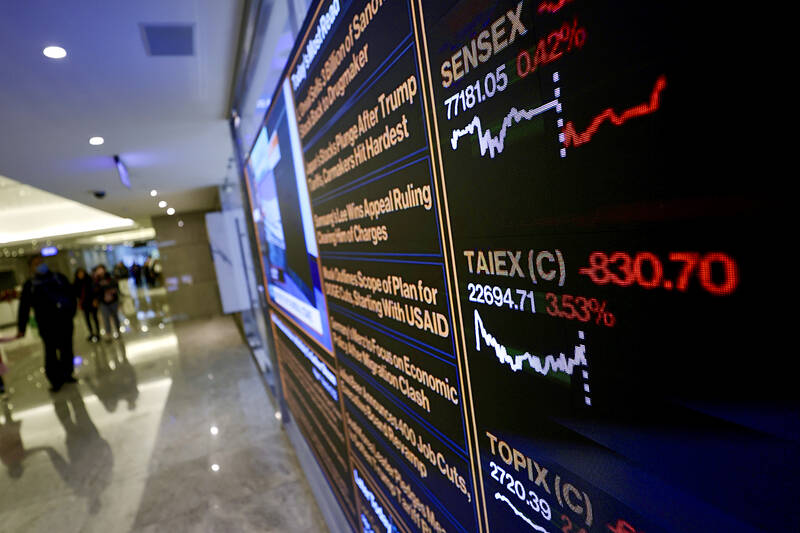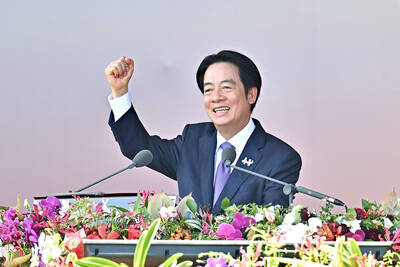The TAIEX yesterday plunged 3.53 percent, or 830.7 points, to close at 22,694.71, as major tech companies took a hard hit from Washington’s tariffs on imports from Canada, Mexico and China, where Taiwanese electronics suppliers have set up factories to take advantage of favorable tax terms.
The recent emergence of a Chinese artificial intelligence (AI) model DeepSeek (深度求索) contributed to the panic sell-off that scourged US tech shares, especially Nvidia Corp, during the Lunar New Year holiday.
“The TAIEX’s poor showing had much to do with Wall Street’s recent performance,” Taiwan Stock Exchange (TWSE) chairman Sherman Lin (林修銘) said at a public function in Taipei.

Photo: Ritchie B. Tongo, EPA-EFE
While DeepSeek raised new uncertainties, US tech giants Meta Platforms Inc and Google’s parent, Alphabet Inc, have reaffirmed their commitment to AI investments, a trend that should continue to benefit local firms in the supply chain, Lin said.
DeepSeek has sparked discussions on AI training methodologies rather than reversing AI development and applications, he said.
Shares of Taiwan Semiconductor Manufacturing Co (TSMC, 台積電), the world’s largest advanced-chip contract maker, shed 5.73 percent to NT$1,070, while AI server maker Quanta Computer Inc (廣達) fell by the daily limit to NT$243, TWSE data showed.
The revenue of Taiwan’s listed firms totaled NT$43 trillion (US$1.3 trillion) last year.
Among this, exports from Taiwan to the US via China accounted for only 5 percent, and exports destined to the US via Canada and Mexico made up a tiny 1 percent, Lin said, seeking to calm market jitters.
Turnover was NT$492.831 billion, with foreign institutional players selling a net NT$74.4 billion, the fourth-largest on record, and proprietary traders cutting stakes by a net NT$20.4 billion of shares, TWSE statistics showed.
Trump has also threatened to slap tariffs on semiconductor imports to encourage chipmakers to set up manufacturing in the US.
Lin said that many Taiwanese firms are agile and resilient, with TSMC already setting up fabs in the US, Japan and Germany.
Other tech companies with operations in Mexico would start to shift production to the US, Lin said.
Japan’s Nikkei 225 ended the day down 2.66 percent and Australia’s S&P/ASX 200 dropped 1.79 percent. Hong Kong’s Hang Seng index finished flat after reopening from the Lunar New Year holiday. Mainland Chinese markets resume trading tomorrow.
Additional reporting by Reuters

The Ministry of the Interior (MOI) is to tighten rules for candidates running for public office, requiring them to declare that they do not hold a Chinese household registration or passport, and that they possess no other foreign citizenship. The requirement was set out in a draft amendment to the Enforcement Rules of the Public Officials Election and Recall Act (公職人員選舉罷免法 ) released by the ministry on Thursday. Under the proposal, candidates would need to make the declaration when submitting their registration forms, which would be published in the official election bulletin. The move follows the removal of several elected officials who were

FOUR DESIGNATED AREAS: Notices were issued for live-fire exercises in waters south and northwest of Penghu, northeast of Keelung and west of Kaohsiung, they said The military is planning three major annual exercises across the army, navy and air force this month, with the navy’s “Hai Chiang” (海強, “Sea Strong”) drills running from today through Thursday, the Ministry of National Defense said yesterday. The Hai Chiang exercise, which is to take place in waters surrounding Taiwan, would feature P-3C Orion maritime patrol aircraft and S-70C anti-submarine helicopters, the ministry said, adding that the drills aim to bolster the nation’s offshore defensive capabilities. China has intensified military and psychological pressure against Taiwan, repeatedly sending warplanes and vessels into areas near the nation’s air defense identification zone and across

SENATE RECOMMENDATION: The National Defense Authorization Act encourages the US secretary of defense to invite Taiwan’s navy to participate in the exercises in Hawaii The US Senate on Thursday last week passed the National Defense Authorization Act (NDAA) for Fiscal Year 2026, which strongly encourages the US secretary of defense to invite Taiwan’s naval forces to participate in the Rim of the Pacific (RIMPAC) exercise, as well as allocating military aid of US$1 billion for Taiwan. The bill, which authorizes appropriations for the military activities of the US Department of Defense, military construction and other purposes, passed with 77 votes in support and 20 against. While the NDAA authorizes about US$925 billion of defense spending, the Central News Agency yesterday reported that an aide of US

NATIONAL DAY: The ‘Taiwan Dome’ would form the centerpiece of new efforts to bolster air defense and be modeled after Israel’s ‘Iron Dome,’ sources said President William Lai (賴清德) yesterday pledged to strengthen the nation’s air defense capabilities and build a “T-Dome” system to create a safety net against growing military threats from China. “We will accelerate our building of the T-Dome, establish a rigorous air defense system in Taiwan with multi-layered defense, high-level detection and effective interception, and weave a safety net for Taiwan to protect the lives and property of citizens,” he said in his National Day address. In his keynote address marking the Republic of China’s (ROC) 114th anniversary, Lai said the lessons of World War II have taught nations worldwide “to ensure that